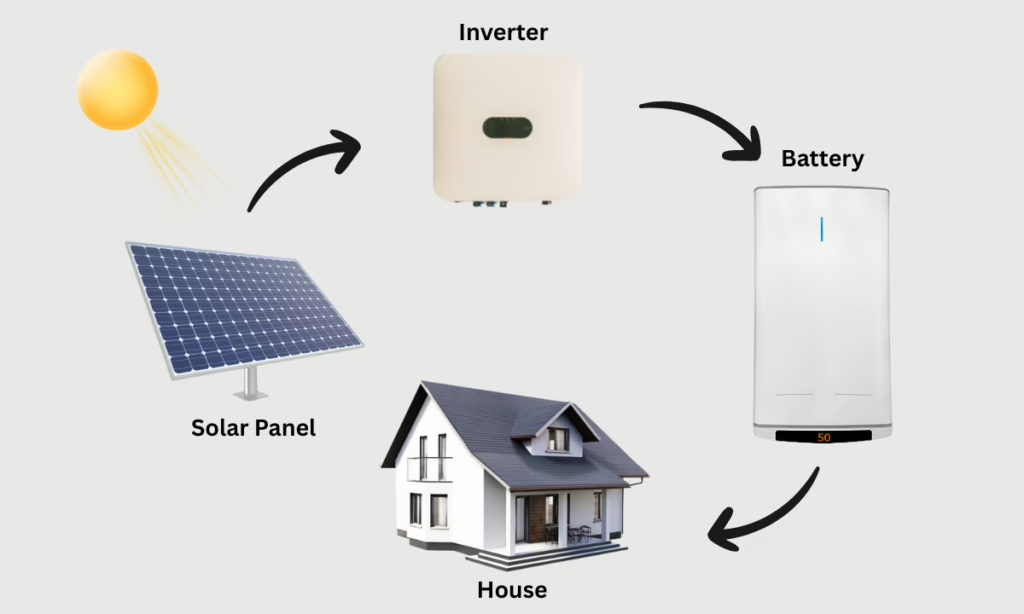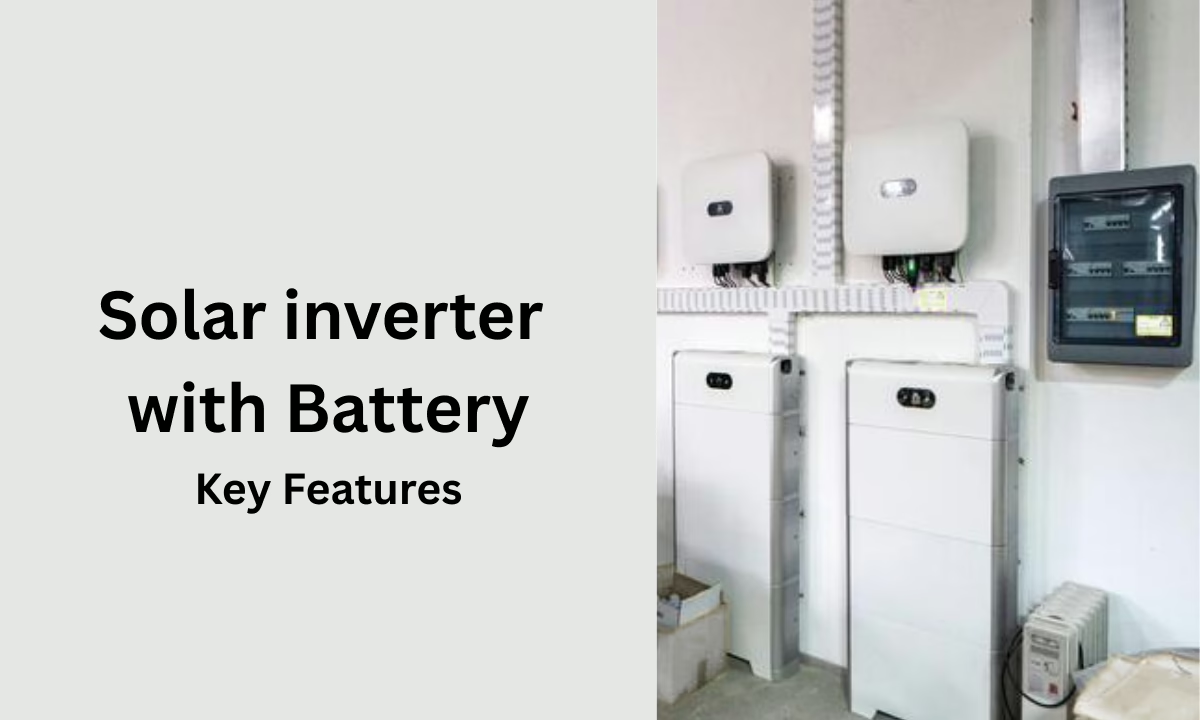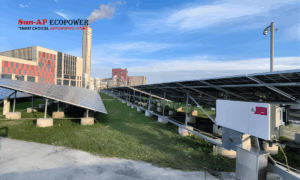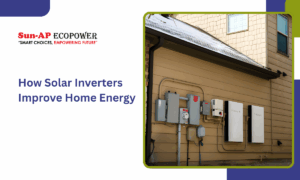Solar inverter technology has become the backbone of modern renewable energy solutions. When paired with a battery, a solar inverter not only converts solar power into usable electricity but also stores it for uninterrupted use.
Whether you are planning to install solar panels for your home, considering a 3 kW on-grid inverter, or exploring efficient energy storage options, choosing the right solar inverter is crucial for long-term performance and savings.
In this blog, we will walk you through the key features you should evaluate before buying a solar inverter with a battery while helping you understand concepts like efficient energy utilization, energy backup, and reliable dealer support.
Why Solar Inverters Matter

A solar panel generates electricity in the form of DC (Direct Current). But your household appliances run on AC (Alternating Current). That’s where the inverter comes in.
- It converts DC into AC power.
- It directs excess energy to your battery for energy storage.
- It ensures you have backup power during outages.
So essentially, a solar inverter is the heart of your solar setup. Without it, your panels and batteries can’t function efficiently.
Key Features to Look for in a Solar Inverter with Battery
1. Compatibility with Solar Panels for Home
Not all inverters are compatible with every type of solar panel. Before buying, ensure your inverter matches your solar panel capacity and technology.
Tip: If you plan to expand your solar setup later, choose a scalable inverter that allows capacity upgrades.
2. Efficient Energy Utilization
The efficiency rating tells you how well the inverter converts solar power into usable energy.
- A high-efficiency inverter reduces energy losses.
- Look for models with 95%+ conversion efficiency for better returns.
| Efficiency Level | What It Means | Benefit to You |
|---|---|---|
| Below 90% | More energy is lost during conversion | Higher bills, less reliable backup |
| 90–95% | Standard efficiency | Balanced performance |
| 95%+ | High efficiency | Maximum savings, better ROI |
3. Energy Storage Options
A solar inverter with a battery should offer seamless charging and discharging.
- During the day, excess solar energy charges your battery.
- At night/outages: stored power runs your home.
Batteries come in two main types:
| Battery Type | Lifespan | Maintenance | Best For |
|---|---|---|---|
| Lead Acid | 5–7 years | Needs regular water topping | Budget-friendly setups |
| Lithium-ion | 10–15 years | Low maintenance | Long-term, reliable use |
Tip: If budget allows, go for lithium batteries—they’re lighter, last longer, and need less care.
4. Smart Monitoring Features
Modern inverters with smart meters allow you to track energy production and usage through dashboards.
- See how much solar energy you are generating daily.
- Monitor battery charge levels.
- Optimize usage for efficient energy utilization.
5. Inverter Type (On-Grid, Off-Grid, Hybrid)
| Inverter Type | How It Works | Best For | Key Benefit |
|---|---|---|---|
| On-Grid Inverter | Connected to the grid, no battery | Homes with a reliable grid supply | Net metering, lower bills |
| Off-Grid Solar Inverter with Battery | Independent from the grid, it relies on storage | Rural/remote areas | Full energy independence |
| Hybrid Solar Inverter | Works with a grid and a battery | Areas with frequent power cuts | Flexible, seamless backup |
Example: A 3 kW on-grid inverter is perfect for small to medium homes in cities, while a hybrid setup makes sense if you want both grid support and backup power.
6. Load Handling Capacity
Make sure your inverter can handle the load of the appliances you plan to run.
For instance:
- A 3 kW solar inverter with a battery can power lights, fans, a refrigerator, a washing machine, and even a small AC.
- Larger households may need 5 kW or above.
7. Durability and Safety Feature
A good solar inverter should be designed to withstand Indian weather conditions, heat, dust, and humidity.
Look for:
- Overload protection
- Short-circuit protection
- IP-rated enclosures (dust and water resistance)
8. Warranty and After-Sales Service
An inverter is a long-term investment. Always choose models with a solid warranty (5–10 years) and reliable after-sales service.
Working with experienced solar inverter dealers in Bangalore gives you peace of mind, as they can guide you through installation, maintenance, and warranty claims.
Real-Life Example
Rohit, a Bangalore resident, installed a hybrid solar inverter with a battery. During power cuts, his lights and refrigerator continue running without interruption. Over time, his electricity bills dropped by almost 40%, and he no longer worries about blackouts.
Tips Before Buying a Solar Inverter with Battery
- Size it right: Match the inverter capacity to your energy needs.
- Expansion plan: If you will add more panels later, choose a modular inverter.
- Go smart: Prefer inverters with mobile app monitoring.
- Check certifications: Ensure BIS-certified or globally recognized safety standards.
- Partner with trusted dealers: Work with a company like Sun Ap Ecopower, which provides end-to-end solar solutions.
Common Myths Around Solar Inverters
Myth 1: A solar inverter works only in sunny weather.
Reality: Panels generate power even on cloudy days, and your battery stores energy for use later.
Myth 2: Batteries don’t last long.
Reality: Lithium batteries can easily last 10–15 years with minimal maintenance.
Myth 3: Inverters are difficult to maintain.
Reality: Modern systems require very little upkeep beyond cleaning panels and basic checks.
Frequently Asked Questions (FAQs)
Q1: What is a solar power inverter?
A: It’s the device that converts DC electricity from solar panels into AC electricity that powers your appliances.
Q2: How does an inverter work with a battery?
A: The inverter charges the battery during the day and discharges stored energy at night or during outages, ensuring uninterrupted power.
Q3: Is a 3 kW on-grid inverter enough for a household?
A: Yes, it’s ideal for small to medium homes, covering basic appliances and reducing dependence on the grid.
Q4: Can I add a battery later to my solar inverter system?
A: Yes, if you install a hybrid-ready inverter now, you can add batteries anytime in the future.
Q5: How do I choose the right solar inverter dealers in Bangalore?
A: Look for dealers with certified products, transparent pricing, good reviews, and long-term service support.
Final Thoughts
Buying a solar inverter with a battery is a long-term investment in both energy independence and financial savings. By focusing on features like efficiency, storage, inverter type, durability, and smart monitoring, you can choose the perfect system for your needs.
At Sun Ap Ecopower, solar inverter dealers in Bangalore, we help homeowners and businesses in India find the right solar solutions, from solar panels for homes to advanced hybrid systems, ensuring clean energy, reliability, and maximum savings for years to come.




